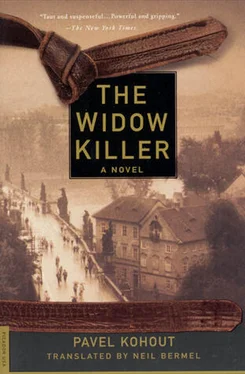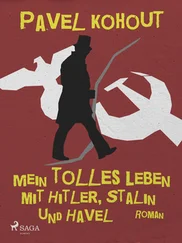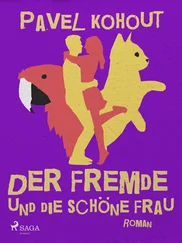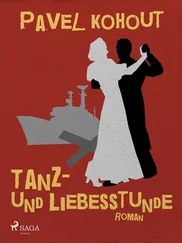“Would you be interested in meeting again, when I have time?”
“No,” he answered forthrightly. “The colonel made it clear that was out of the question.”
“I’m not his property,” she announced flatly. “I’m no one’s, not anymore. I’m a free spirit. If some day you feel ready to listen to me the way I listened to you today, you know where to find me. And don’t worry, our number one spy won’t find out.”
During the whole trip home on foot — an impulse he’d suddenly succumbed to — Buback found himself unable to concentrate. He felt torn asunder: He belonged to his old love, as he headed towards new hope, but out of the blue he had found a strange affinity with this unknown creature, who had captured the heart of the Protectorate’s third-in-command.
Hedvika Horáková found a friend at the graveyard. For three months she had stood alone, twice a week, at the grave of her spouse, killed by a toppled crane during the Totaleinsatz — the total deployment — in Essen. Then, one February day, a fresh hole greeted her from nearby. The next day it had been filled in, and she found a sister in grief sobbing over it.
They hit it off right away. On the fourteenth of February, Marta Pavlátová had been making lunch for her husband, who was on the afternoon shift at the Pragovka factory. As usual, he was hanging around the kitchen getting on her nerves, so she chased him off to the grocery store on the opposite corner for their potato rations. From the kitchen’s second-floor window she could see him leaving the store with a full string bag, when all of a sudden a giant invisible hand picked her up and carried her across the apartment; the weight of her body smashed open the door into the hallway and landed her with a blow against the door onto the staircase.
When she managed to stand up and scramble back into the kitchen, the view from the dusty window opened onto a completely unfamiliar street. The grocery store building was split in two; its left half had collapsed into the small square. Only afterward did she notice that the rag doll lying in the center of it was wearing her husband’s pants and sweater.
Hedvika’s tragedy was a hundred days older; she could lend Marta courage. Both were twenty-seven; both had waited to start a family until after the war and were now left alone. They thanked fate that they had met. Hedvika sewed at home; the cinema owner had taken Marta on as an usher. For the moment, they had no reason or desire to look for new partners. Every Wednesday and Saturday before noon they would meet at the Vy  ehrad cemetery, which was roughly the same distance for both of them — Marta from Pankrac and Hedvika from Emauzy — clean up the gravesites, and set off along the ramparts of the old castle. They would stroll around the accessible portions, taking in the panorama of their native city, which was pulling free from winter’s grip just as slowly and unhurriedly as spring approached.
ehrad cemetery, which was roughly the same distance for both of them — Marta from Pankrac and Hedvika from Emauzy — clean up the gravesites, and set off along the ramparts of the old castle. They would stroll around the accessible portions, taking in the panorama of their native city, which was pulling free from winter’s grip just as slowly and unhurriedly as spring approached.
Then they would head back to one house or the other, depending on whose turn it was to prepare lunch. Over the meal they would talk about what had happened to them, and try to guess when and how the war would end — and what they would do then. They soon admitted to each other that their husbands had disappointed them. They honored the memory of the departed, but believed that once freedom came, a new and better chapter of their lives as women would then begin.
Today they had met as usual, Marta still in black, Hedvika — who simply could not stand the color anymore — in long beige slacks and a quilted bodice, with a kerchief tied around the top of her head. This time they set off for Pankrác, where at Maria’s a rare treat awaited them: potato pasta with poppyseeds.
She had barely begun to cook it, adding the rabbit lard sparingly, when the doorbell rang. Marta’s husband had worked the night shift every third week; at his wife’s request he had equipped the door with a solid chain lock. Now it allowed her to open the door without fear. She spotted an unknown man in a smallish winter coat, unbuttoned to reveal a mouse-colored suit. In one hand he held the stuffed briefcase of an office worker; with the other he raised a flattened hat.
“Excuse me for disturbing you,” he said politely, “but I was told that I might find Mrs. Horáková here.”
“Yes, of course….”
Although only a month had passed since they met, it did not surprise Marta to find someone asking after her friend here. Out of habitual caution she left the chain hitched and called into the kitchen.
“Hedvika, there’s a man here looking for you….”
Even the other woman was not too surprised; she too, in the short time they had known each other, had started thinking of her friend’s house as home. She came into the entrance hall, and the man through the slit in the door raise his hat again.
“Mrs. Horáková?”
“Yes….”
“I’m sorry to drop in on you like this, but it’s in your interest. Your husband perished in the February air raid, didn’t he?”
“No! There’s been a mistake.”
His hand, which was just replacing the hat, suddenly shook severely. It seemed to both women that he was about to faint.
“That was my husband,” Marta exclaimed, “Radomír Pavlát.”
“My husband, Ludvík Horák,” Hedvika added, “lost his life last year during the Totaleinsatz in the Reich.”
The visitor immediately calmed down.
“I must just have mixed up the names, then; I do apologize. As it happens, it concerns both of you. The offices of the Protectorate will be paying the families of air-raid and Totaleinsatz casualties a lumpsum compensation. I’m distributing questionnaires that must be filled out and signed. When they sent me here, I never thought I’d be able to take care of both you ladies.”
“Why don’t you come in?” Marta offered, and pushed the door to, so she could unhook the chain.
“But who sent you here?” Hedvika suddenly wondered. “I don’t think anyone in my building knew—”
The man was already in the apartment and slammed the door behind him. His free hand suddenly held a long, thin knife.
“One word out of you,” he hissed, “and I’ll cut your throats.”
At first glance Lieutenant Colonel Hinterpichler was a lover of good drink, better suited to lederhosen than a buttoned-up uniform. As head of the anti-black market and economic sabotage division, he had apparently been appropriately instructed by Meckerle. Hinterpichler passed his assistant the sheet of paper where Buback had written the name and address of Jitka’s father (obtained from Beran that morning by telephone), and ordered the man to connect him immediately with the head of the appropriate office.
He offered Buback a cognac, which he claimed was an old French variety just seized from a black marketeer, and for a few minutes made small talk with him as if they were old chums in a pub. Finally one of the phones on his desk rang. Like an actor finishing his coffee and stepping onstage to play a sovereign, he instantly modified his voice and demeanor. Suddenly he was every inch a high functionary of the forces everyone feared so greatly, including their own employees.
Having demonstrated his authority, he listened silently to his subordinate in Moravia. The gold pen in his hand hung poised over the paper. Finally he asked a question.
“How is he physically? Can he stand a few knocks?”
Shortly thereafter he nodded contentedly and made his pronouncement.
“Slap him around a bit, but don’t overdo it. Then stick him with a heavy fine and let him go. Heil Hitler.”
He replaced the handset and, back behind the curtains, was jovial again, giving Buback a conspiratorial wink.
Читать дальше

 ehrad cemetery, which was roughly the same distance for both of them — Marta from Pankrac and Hedvika from Emauzy — clean up the gravesites, and set off along the ramparts of the old castle. They would stroll around the accessible portions, taking in the panorama of their native city, which was pulling free from winter’s grip just as slowly and unhurriedly as spring approached.
ehrad cemetery, which was roughly the same distance for both of them — Marta from Pankrac and Hedvika from Emauzy — clean up the gravesites, and set off along the ramparts of the old castle. They would stroll around the accessible portions, taking in the panorama of their native city, which was pulling free from winter’s grip just as slowly and unhurriedly as spring approached.










